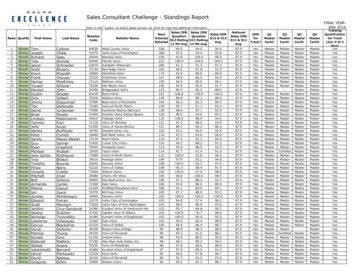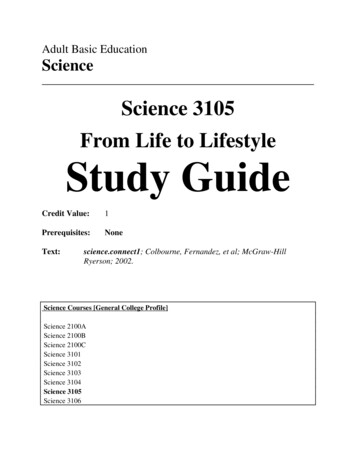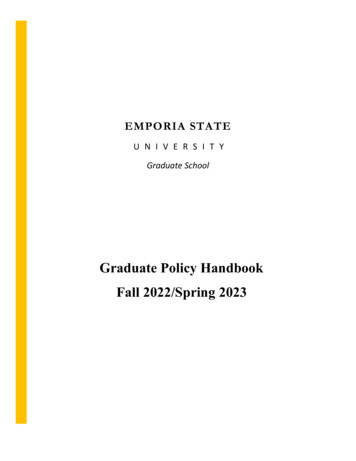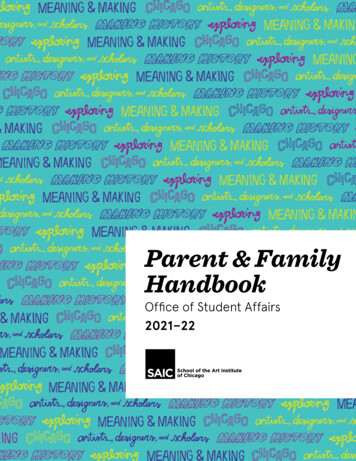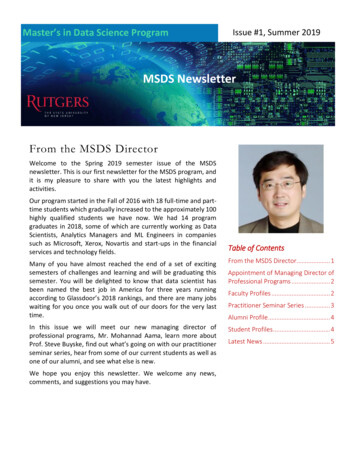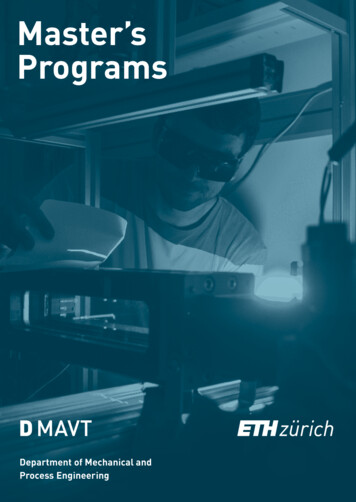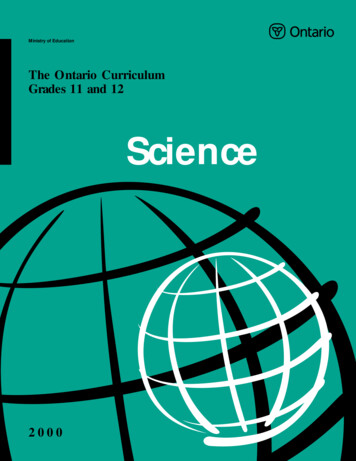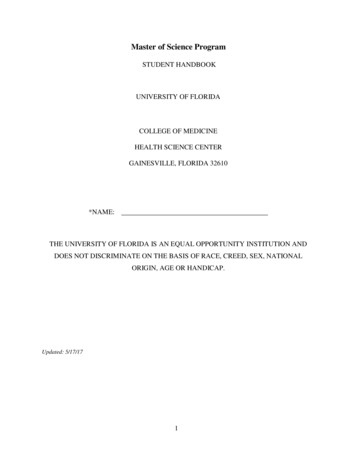
Transcription
Master of Science ProgramSTUDENT HANDBOOKUNIVERSITY OF FLORIDACOLLEGE OF MEDICINEHEALTH SCIENCE CENTERGAINESVILLE, FLORIDA 32610*NAME:THE UNIVERSITY OF FLORIDA IS AN EQUAL OPPORTUNITY INSTITUTION ANDDOES NOT DISCRIMINATE ON THE BASIS OF RACE, CREED, SEX, NATIONALORIGIN, AGE OR HANDICAP.Updated: 5/17/171
TABLE OF CONTENTSWELCOME FROM THE FACULTY .4PURPOSE OF STUDENT HANDBOOK .4FACULTY AND ADMINISTRATIVE STAFF .5CONTACT INFORMATION.5COLLEGE OF MEDICINE MASTER’S OF SCIENCE PROGRAM .6I.Pertinent Arrival InformationA. Payroll Information .7B. Check in with the Master’s Program Office .7C. Keys and Identification Badge .7D. Health Insurance .8E. Mail .8F. Fee Payments .8G. Funding and Financial Aid .8H. Registration .9I.Change of Address .9J.Qualifying for Florida Residency .9K. E-mail Accounts, Internet access .9L. World Wide Web and Email Addresses .10IIUniversity and Administrative Requirements and PoliciesA. Teaching Requirements .10B. Vacation Policy .10C. Other University, HSC and IDP Office InformationC1. Libraries .10C2. Work-related Injuries .11C3. Non-work Related Injuries .11C4. Emergency Contacts and Safety Concerns.11C5. Housing .11C6. Traffic and Parking Regulations .11D. Policy on Sexual Harassment.12E. In-House Counseling & Development Office.12F. Governance of the Master’s Programs.12III.Degree Requirements for Master of Science DegreeA. Course Offerings . . .13B. Transfer of Credit . 13C. Appointment of Supervisory Committee .14D. Supervisory Committee Meetings .142
E.F.G.H.Thesis .16Thesis Defense and Final Examination.17Certification .18Placement after Graduation.18IV. Course Selection and Curricula .18V.Standards and Grades .18VI. Role of the Advanced Concentration Graduate SecretaryDuring your Graduate Student Tenure.19VII. Grievances.19VIII. Integrity in Graduate Study .21APPENDICESA.B.C.D.E.F.Map of the Health Science Center .22Links and Email Addresses.23Supervisory Committee Appointment Form . .24Supervisory Committee Meeting Report Form.25Thesis Checklist .26Integrity in Graduate Study .283
WELCOME FROM THE FACULTYWe are pleased that you have elected to enroll in the Science Master’s Program in TranslationalBiotechnology at the University of Florida, College of Medicine. Soon you will study alongsidegraduate students engaged at every level of the research and educational enterprise within theCollege. Through dedication and scholarship, you will join this group of men and women andbecome an independent biomedical scientist. Friendships and associations that you will buildduring your graduate training will be of enduring value both personally and professionallythroughout your career. We trust that you will experience the thrill of scientific discovery, thespirit of collaboration, and the scholarly brotherhood felt by the faculty and students in ourprogram.The hallmark of our program is that both basic and clinical faculty members coordinate their effortsfor a common goal; to providing outstanding mentorship in the training of each student. Thus, ourobjective is to provide the highest quality environment and intellectual excitement for everystudent’s research and educational training. The faculty is constantly striving to challenge ourstudents and provide the opportunity for discovery.PURPOSE OF STUDENT HANDBOOKThis handbook is intended to serve as a single-source reference both for our new and continuinggraduate students in the Master’s Program. Retain the handbook and use it as a guide throughoutyour graduate education.This handbook is intended to provide a concise summary of University and master’s programoperating procedures. Your responsibilities and obligations as a graduate student in the College ofMedicine are delineated. Please become familiar with the contents of this handbook. It shouldprovide useful information and answer most of the questions that will arise during your tenure inat the University of Florida.Parts of the handbook concerning general University regulations have been copied verbatim. Ifquestions or problems arise that are not covered in the handbook, please feel free to contact theprogram director or the administrative staff (contact information on page 5).Suggestions for improving the program or the handbook are always welcome.There is a map in Appendix A which should help you navigate the Health Science CenterBuildings.4
FACULTY AND ADMINISTRATIVE STAFF:Master’s Program Director:Henry Baker, Ph.D.Master’s Advisory Board:Henry V. Baker, Ph.D, Molecular Genetics and MicrobiologyScott Tibbetts, Ph.D, Molecular Genetics and MicrobiologyPaul Gulig, Ph.D, Molecular Genetics and MicrobiologyLizi Wu, Ph.D, Molecular Genetics & MicrobiologyThomas Rowe, Ph.D, Pharmacology and TherapeuticsGreg Schultz, Ph.D, Obstetrics and GynecologyProgram CoordinatorKris MinkoffCONTACT INFORMATIONNameEmailPhoneRoomHenry BakerPaul GuligKris MinkoffThomas RoweGregory SchultzScott TibbettsLizi 5-244M-337ER2-291CG 3625
Master of Science ProgramThe Master of Science Program is a one-and-a-half-year thesis program that is researchintensive. The Master of Science in medical sciences has the support of the Provost, the VicePresident for Research, and Deans of the Colleges of Medicine.The program is focused on applied research.Other features of the program are the infusion of personal and professional skills(communication, documentation, teamwork, work ethic, etc.), ethics and responsible conduct ofresearch, and international perspectives.Program Specifics1. Two-step Admission: Step 1: A provisional acceptance is given to students who meet therequirements for GRE scores and academic performance of minimum combined GRE scoreof 300 and GPA of 3.0 or higher. Step 2: All students must show proof of funding for twoyears. There are various ways that proof of funds can be accomplished. For more on fundingoptions, please see the “Funding and Financial Aid” section of the handbook.2. Degree Requirements: Completion of your degree will require a total of 33 credits with 24credits comprising of formal coursework and laboratory research. You will choose yourcourse in consultation with your mentor, program coordinator and program director based onprogram requirements and your career goals.3. Full-time Status: In order for you to be considered full time, you need to take 9 credits inboth Fall and Spring Semesters and 6 credits in the summer. Therefore, to satisfy the Master’sprogram requirements the required credits are as follows:Year 1 Fall: 9 cr; Spring: 9 cr; Summer: 6 crYear 2 Fall: 9 cr;4. Education and Training: A foundation of the program is a high-quality research projectunder the direction of a skilled mentor, with supervision by a committee composed ofmembers of the University's Graduate Research Faculty. Specialization may be in any of thefields of research being pursued in the College of Medicine. During your first year in theprogram you will enroll in, lecture courses and seminar courses, and begin working in yourmentor’s laboratory. Both the seminar series and the lecture courses provide preparation forMaster’s research which should be well underway by the end of the second semester. Youmay also enroll in additional courses, according to your interests and career goals.6
A.Initial Check in with the Master’s Program OfficeUpon your arrival, your first stop will the masters program office ARB, R2-220 where you willbe directed to complete the necessary paperwork for your appointment. You will need to providethe following materials: Social Security Card, a voided check, driver’s license and immigrationstatus information including the appropriate permanent residency card, DS2019, VISA frompassport, I-94 form, and F-1 documentation (if applicable). No Copies, originals required.International students must be physically present in the US for ten (10) days before they can requestthe Social Security Card which is necessary to sign up for payroll.B.Minimum Stipend, Tuition, Health CareThe current minimum stipend for master’s students is 15,000, the tuition waiver is 10,800annually, and GatorGradCare health coverage is approximately 1,300. The totalcompensation the faculty member is expected to pay annually is 27,010.Payroll Signup, Letters of Appointment (tuition waiver)Once you have identified a mentor with graduate faculty status and are fully accepted into theprogram you will work with your mentor’s department to complete payroll signup procedures.Payroll is issued bi-weekly and the funds will be direct-deposited into your personal checkingaccount. You will be able to view the amount of payment and any deductions (a paystub) athttp://my.ufl.edu my self service payroll and compensation view paycheck. It can beviewed the Friday of each pay week.Graduate assistantship appointments may be made on a semester-by-semester or annual basis.Dates for appointments are published on the UF Academic Calendar and are available on thefollowing chool.ufl.edu/C.Keys and Identification BadgeDuring normal business hours there is no need for a building key to the general facility, althoughmost doors are locked in the evening and on the weekends. Commonly used facilities, McKnightBrain Institute, Academic Research Building (ARB) and the Cancer Genetics ResearchComplex, are closed and locked from 6:30 p.m. to 6:30 a.m. weekdays as well as all weekendhours. The ARB has an electronic lock system for after-hours. To activate your access bringyour Gator 1 card to ARB room R2-220 where it will be entered into the system to beactivated.Likewise with authorization from your mentor and your departmental administrative office willissue lab keys.7
The Health Center requires that identification badges be worn at all times while personnel are onthe premises. All students should go to either Gator 1 Central located at 1900 Museum Road inthe Reitz Union Student Center Bookstore or to ID Card Services on the ground floor of theHealth Science Service Center (Room NG-10). Please bring a picture ID and tell them you are anew graduate student in the College of Medicine. If you have any problems, please call yourhome department administrative staff.D.Health InsuranceAll students on graduate assistantships are eligible to participate in GatorGradCare at no cost tothem. Insurance registration is done online at adcare/. Be advised it is important to sign up before the initial employmentdeadline or you will have to wait until the next open enrollment period.All international students are required to purchase health insurance that is approved by theFlorida Board of Governors. It is the student’s responsibility to provide proof of insurance to theOffice of International Studies & Programs at 1765 Stadium Rd, suite 170 Hub (352)-392-5323prior to each registration term. Once confirmation for insurance is received, it should beforwarded to insurance@ufic.ufl.edu so that the insurance hold will be lifted.E.MailA branch of the U.S. Post Office is located on the ground floor of the Medical Sciences Building.The address is Your Name, College of Medicine, Department of ., PO Box 100XXX,Gainesville, FL 32610-XXXX.F.Fee PaymentsThe deadline for payment of student fees is early in the semester, it is your responsibility to payfees before the deadline date. There is no basis for petitioning to waiver a late paymentpenalty.The UF Graduate School Academic Calendars are available athttp://gradcatalog.ufl.edu/index.php under academic calendar. The amount of your portion of fees(after tuition payments have been applied), can be found on your ISIS account(http://www.isis.ufl.edu). To find out the amount of your portion of fees (after tuition paymentshave been applied), check with ISIS (http://www.isis.ufl.edu). Failure to pay your portion by thedeadline will result in a 100 late payment penalty. A secure payment drop box is locatedoutside the Bursar’s Office in Criser Hall, Room S113. For a list of other payment options,please visit: ents/payment-options/. If youhave further financial questions, most answers can be found .Funding and Financial AidGraduate Assistantships are sometimes offered by mentors. This includes a stipend with a tuitionwaiver, and GatorGradCare coverage. It is your responsibility to make sure your student fees are8
paid on time. If you are unable to obtain an assistantship you may choose to self-fund or byapplying for various forms of financial aid. For more information on different types of aid nding/financial-aid.For federal loans, please see the student financial aid administration or call at 352-273-7939.For loan deferments of federal student loans, please see the Graduate Education Office in RoomM 134. DO NOT go to Criser Hall for loan deferments.H.RegistrationStudents will be registered for all your fall courses when they check in with the Master’sProgram Office. Students should ensure that they do not have any holds on their record forimmunizations, insurance, emergency contact information, local address, registration checklist,or financial services. You need to clear all holds prior to being registered. Failure to do so willresult in a late fee which will be your responsibility.I.Change of AddressA change of address can be submitted using the student’s ID and PIN number atwww.isis.ufl.edu.J.Qualifying for Florida ResidencyInformation about establishing residency can be found at the following rements.phpK.E-mail Accounts, Internet accessThe University of Florida and the college of medicine uses email to communicate with theirstudents, faculty and staff. The official email system of UF is gatorlink. You are required to havea gator link account. Official programmatic information and announcements will only be sent toyou to your gatorlink account.To set up a gatorlink email account you need to visit the UF Computing Help Desk at:http://helpdesk.ufl.edu/self-help/. Here you will find all the necessary self-help resources to beable to create your GatorLink account.If you encounter problems with your GatorLink account, your username, or your password, youshould contact the UF Computing Help Desk at 392-HELP. All UF applications now requireyour GatorLink user name and password.9
L.Web AddressesWeb address to pages contains useful information regarding the graduate program and studentservices are found in Appendix B.II.University and programmatic Administrative Requirements and PoliciesA.Teaching RequirementsThere are no formal teaching requirements for students in the Master’s program.B.Vacation PolicyStudents on assistantships may take up to 5 days per semester of personal leave. The schedule ofany vacation time must be approved in advance by their mentor. As employees of theUniversity of Florida, graduate assistants are also entitled to days off for designated official paidholidays, declared emergencies, and travel to scientific meetings. University breaks (i.e. SpringBreak) are not considered as additional vacations. According to the GAU contract, vacation daysare not cumulative, i.e. days not taken in one semester do not carry over to the next semester.Since the demands of graduate studies and research do not easily fit into a rigid schedule, it isexpected that students will take a mature committed attitude toward their professionalresponsibilities.Students planning any extended travel for personal reasons, e.g. vacation or marriage, shouldplan to take a leave of absence from the program for 6 weeks during either the summer A orsummer B term. While on leave of absence you will not be: 1) Paid a stipend, 2) registered forclasses, or research credits, 3) will not be liable for payment of student fees. GatorGradCarehealth insurance will still cover you for the full summer (if you were previously enrolled in theSpring term).C.Other University, Health Science Center and Programatic InformationC1.LibrariesThe Medical Center Library is located in the Communicore of the J. Hillis Miller Health Center.It contains a large collection of medical, chemical, and biological journals, as well as a widearray of texts and reference materials. Students are required to present their identification badgeswhen checking out materials. hsc-libraries/)Another excellent source is the Marston Science Library on Newell Drive diagonally across fromCentury Tower. It houses the combined holdings of the Agriculture, Life Sciences, Engineering,Physical sciences, Mathematics and Earth Sciences libraries.10
C2.Work-Related InjuriesFor non-serious injuries you should first contact the worker's comp contact person in yourdepartmental area to fill out the forms. You may then go to the Student Infirmary for treatment.For serious injuries you should go directly to the Shands Emergency Room for treatment. Uponarrival you should inform the admitting clerk of your graduate status and that the injury is workrelated. As soon as possible after treatment, contact your department so that a worker’scompensation form and accident/injury form can be prepared.C3.Non-Work Related InjuriesFor injuries that are not related to your work, you may contact the student infirmary or healthunit of your choice. You should present your health insurance card when you sign in. Althoughyou will be billed at either place, the student infirmary costs are usually fully covered by yourstudent activities fees. (See Student Health Care Center website: http://shcc.ufl.edu/Do not go to a UF Health clinic without first going to the Infirmary for referral.This is important because your health insurance policy may require referral by theinfirmary.C4.Emergency Contacts and Safety ConcernsAll emergencies pertaining to fire or police should be reported to the University PoliceDepartment, Phone: 392-1111. SNAP (Student Nighttime Auxiliary Patrol) can provide anescort after dark to anywhere on campus. They can be reached at 392-SNAP (7627) or bydownloading the TapRide SNAP app. Directions for downloading the app can be found -campus housing is available on a very limited basis for both single and married students.Generally a waiting period of at least several months is encountered. Contact the Division ofHousing for information (352)392-2171 or http://www.housing.ufl.edu/. The Housing officealso distributes extensive lists of off-campus apartments and houses available for rent, andprovides useful information about each. The Division is located at Museum Road and 13thStreet just east of Beatty Towers.C6.Traffic and Parking RegulationsOnly University vehicles are permitted to drive on the central campus Monday-Friday between8:30 a.m. and 4:30 p.m. Any student of the University can register a car. Eligibility for aparking permit is determined by the student's local address and academic classification. ContactTraffic and Parking Services for additional information. They are located at 1273 GaleLemerand Drive. Phone: 352-392-PARK (7275) or http://www.parking.ufl.edu.11
D.Policy on Sexual HarassmentWHAT IS SEXUAL HARASSMENT?According to the Sex Discrimination Guidelines promulgated by the Equal Employment OpportunityCommission (EEOC), sexual harassment is a form of sex discrimination. The guidelines define sexualharassment at 29 C. F. R., Section 1604.11 as follows:Unwelcome sexual advances, requests for sexual favors, and other verbal or physical conduct of asexual nature constitute sexual harassment when:1)2)3)submission to such conduct is made, either explicitly or implicitly, a term or condition of anindividual's employment or academic performance.submission to or rejection of such conduct by an individual is used as the basis for employmentor academic decisions affecting such individual, or job applicant, and between graduateassistant and student.such conduct has the purpose or effect of unreasonably interfering with an individual's workor academic performance or creating an intimidating, hostile or offensive working oreducational environment.For more information, please see the website:http://www.ufsa.ufl.edu/faculty staff/fees resources policies/sexual harassment/E.In-House Counseling & Development OfficeThe Office of Student Counseling and Development is available to graduate students in the Collegeof Medicine who may have personal or professional issues that could be helped with consultationfrom a qualified counselor. Student-counselor conversations are strictly confidential. You mayreach counseling services at www.counseling.ufl.edu/cwc/ or by calling 352-392-1575. Thisoffice also sponsors workshops throughout the year that may be helpful in your personal or careerdevelopment. More information can be found at: http://counseling.med.ufl.edu/.F.Governance of the Masters of Science ProgramAn advisory board makes the policies that govern the Masters of Science and Masters of ScienceCombined Degree programs. Members are invited to serve by the Director and serve for two years.The Chair of the Molecular Genetics and Microbiology Department are permanent members of theBoard. The current Board members are listed on page 5.12
III.Degree Requirements for Master of ScienceA. 33 credit hours of graded courseworka. 24 credits of formal courses.i. A minimum of twelve (12) credits will consist of graded GMS courses.Most students take about 18 credits. In some cases, other non-GMSgraduate level courses may help satisfy this requirement with approval ofthe student’s graduate supervisory committee and director of the program.ii. Other courses are required but are evaluated Satisfactory/Unsatisfactory(S/U)1. Essentials of Graduate Research & Professional Development(GMS 6003) - required2. 3 credits of GMS 7194 (Biotechnology Seminar) - required.b. 9 credits of laboratory researchi. There is a limit of 10 credits of GMS 6905 (Independent Research) and 5credits of GMS 6910 (Supervised Research).ii. Must register for a minimum of 3 credits of GMS 6971 (Master’sResearch) and up to 6 hours1. 3 credits must be taken during the semester the student plans tograduateB. Thesis – you and your mentor must agree on thesis project by November 1st of your firstyear.C.Transfer of CreditOnly approved graduate level course earned with a grade of “B” or better may be transferred.Transferred credits cannot have been used to satisfy the requirements for another degree. Amaximum of 15 credits from post baccalaureate courses may be transferred to the master’sprogram. A Transfer of Credit form is submitted to the Master’s Program Director for signature,and then to the Associate Dean for Graduate Education for approval. A copy of the transcript ofthe credits involved should accompany the form which is available uate-Credit-Transfer-Form.pdfAfter approval by the College of Medicine, the request will be sent to the Graduate School forapproval.A. Appointment of Supervisory CommitteeCommittee members are recommended by the student and mentor and reviewed by Master’sProgram Director. All members must have Graduate Faculty status.A form must be signed by each person on your committee, the departmental chair for your mentor,13
and BEFORE the administrative staff can officially process your supervisory committee online.The mentor is Chair of the Supervisory Committee. The committee should be selected and in placeby the end of the Fall term. The Dean of the Graduate School is an ex-officio member of allSupervisory Committees. Supervisory committees are required to have a minimum of threemembers of the Graduate Faculty, including a committee chairman (the student's thesis advisor),and at least two other faculty selected from the Graduate Faculty.The duties of the Supervisory Committee are as follows:l.To coordinate the overall research program in accordance with all regulationsconcerning the MS degree. The student has the responsibility to learn theseregulations.2.To meet annually during the course of the master’s research to review progress andapprove plans for completion of the research.3.To meet when the research thesis is completed and to conduct the final oral defenseto assure that the thesis is a piece of original research and is a contribution toscientific knowledge.Choosing Your Thesis ProjectThesis research projects must be identified and approved by your mentor and masters programdirector by November 1 of your first semester in the program.During their graduate training, students are encouraged to take full advantage of all of the advisorsdescribed above, especially if problems arise. Problems that concern an individual student'sstanding or curriculum, which cannot be handled by the Master’s Program Director, the mentor,or the student's Supervisory Committee, may be referred to the Graduate Curriculum Committee,and then, if necessary, to the faculty at large. If problems arise that cannot be adequately addressedthrough these channels, students may refer to the College of Medicine's Student AdvocacyCommittee.D. Supervisory Committee MeetingsThe supervisory committees should meet in person at least once every 12 months to evaluate thestudent’s academic and professional progress. Between these meetings (at approximately sixmonths), the student/committee has the option to submit a formal progress report to theircommittees (“virtual” meeting) in lieu of a face-to-face meeting. This report should consist of 25 pages describing (1) the progress made in each Specific Aim since the previous meeting (helpfulfigures/tables are encouraged), (2) planned experiments for each Aim, and (3) any additionalinformation such as presentations at scientific meetings or publications underway. Students may14
also specifically request input about any concerns. Further, anyone in the process, from thestudent, the mento
graduate students in the Master's Program. Retain the handbook and use it as a guide throughout your graduate education. This handbook is intended to provide a concise summary of University and master's program operating procedures. Your responsibilities and obligations as a graduate student in the College of Medicine are delineated.

